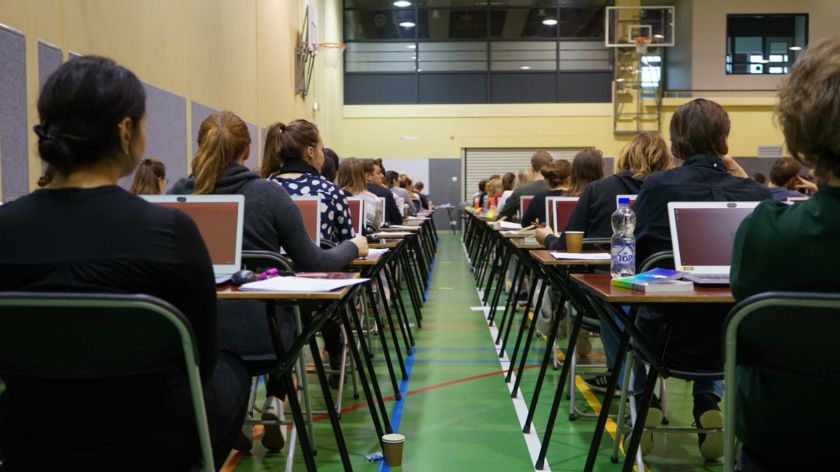Possible ‘Large-Scale Fraud’ in Economics Exams
-
 Foto: Chamin Panapala
Foto: Chamin Panapala
The Economics Examination Board has begun an investigation into the Advanced Accounting oral exam due to an anonymous complaint from a student. If the complaint is upheld, all students may have to retake the exam. Another course in the Economics programme may have to administer a partially new exam due to issues as well (although 98 percent of the students initially passed the exam).
The anonymous student claims to represent a large group of fellow students. ‘The letter states that during the Advanced Accounting exam some of the students committed fraud on a large scale,’ says Agnes Akkerman, Chair of the Examination Board and Professor of Work Relationships. She does not want to say what this fraud specifically entailed, except that it concerns ‘various elements’ of fraud.
The Same Exam Questions
There is speculation among students that the complaint was submitted by a student who received an insufficient grade. The lecturer of the course asked all students the same questions, so those who had already taken the oral exam were able to pass the exam questions on to fellow students. This would have given the students who were scheduled to take the exam later an advantage. ‘We are now investigating whether the lecturer did indeed ask the same questions on multiple occasions. It’s not hard to imagine students thinking that way,’ says Akkerman.
If the Examination Board declares the complaint well founded, all students may have to retake the exam during the summer holidays. This scenario is made more difficult by the fact that the lecturer of the course temporarily took a leave of absence for private reasons and can therefore no longer administer oral exams. His absence is unrelated to the commotion surrounding the exam.
Taking Measures
Advanced Accounting is not the only third-year course in the Economics degree programme experiencing exam issues. Even though 98 percent of students initially passed the exam, part of the Topics in Business Economics exam must be retaken as well.
‘I have never experienced that in my 20-year career as a lecturer,’ says Max Visser, the lecturer for the course. ‘We quickly found out that for three knowledge questions many students copied and pasted elements from the PowerPoint presentation of the course (editor’s note: students had this available during the exam). That is why we have to take measures, or we’ll make fools of ourselves.’
‘I have never experienced that in my 20-year career as a lecturer’
Is it not naive to think that students who are sitting at home without any surveillance can resist temptation to use additional resources? Visser emphasises that previous digital exams had a normal success rate. ‘This is all new to us, but we thought we had found a good method. We have taken the same measures with this course as with those previous online exams, such as shortening the time limit. Apparently the students in this exam have “learned” how to avoid the rules.’
Left in the Lurch
There is a lot of dissatisfaction among students about the situation. ‘We have been left in the lurch,’ says one student who prefers to remain anonymous. ‘I might have to retake exams well into my summer holidays. For my enrolment in my Master’s programme I must officially submit a grade list with a maximum of one ungraded course before 1 July. What if I cannot meet this deadline because of to the Examination Board and I end up with a study delay?’
Another student in the Law & Economics programme is also disappointed with all the uncertainty. They also want to remain anonymous. ‘I still have 50 more credits to earn this term. I really cannot take on two resits. It causes me a lot of extra stress, especially because there is nothing I can do about it.’
Akkerman finds the uncertainty very troublesome for the students who are taking the course. ‘That’s why we are trying to provide clarity as quickly as possible in a thorough manner. The current situation is very difficult, but it is important that the quality of the diploma is preserved.’
Disaster
The Law & Economics student finds the chaos surrounding the exams symbolic for the Economics programme. ‘This would never happen in the Law degree programme,’ he says ‘Organisationally, the programme is a disaster. It is one of the reasons why I am not staying in Nijmegen for my Master’s degree.’
Akkerman is sorry to hear the student’s statements. ‘I do not see this reflected in the course evaluations of my own courses or courses of colleagues. Students who feel this way are welcome to discuss this with the degree programme,’ she says. ‘It’s important for us to understand where such sentiments come from.’



